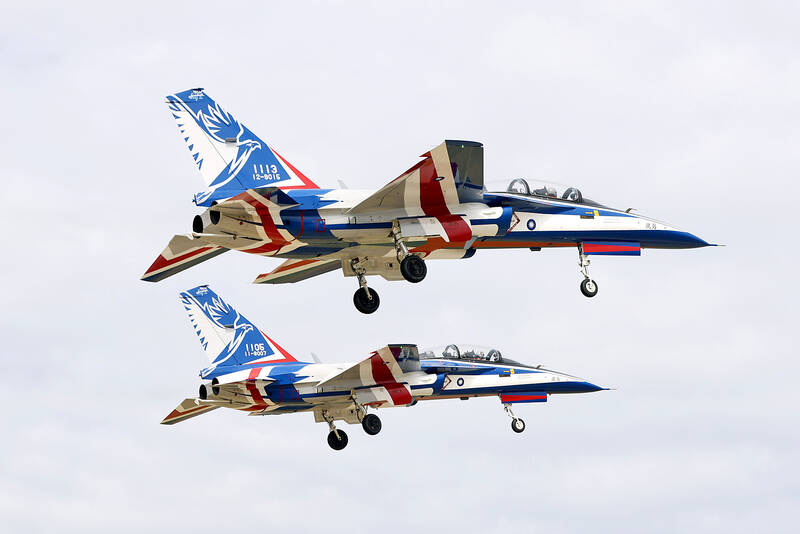The nation’s main domestic aircraft developer yesterday said that it has completed the first stage of design for a military trainer aircraft destined to replace the air force’s Beechcraft T-34C trainers, which are near the end of their service life.
With the completion of the first stage of the design process, the second stage can start once the air force initiates the process to develop and build a new trainer jet, Aerospace Industrial Development Corp (AIDC) said.
A prototype could be built by 2028 and mass production begin in 2031, AIDC said in a statement.

Photo: Ritchie B. Tongo, EPA-EFE
The plan to develop and build 45 domestically made trainers would cost an estimated NT$21.4 billion (US$690.3 million), AIDC said, while obtaining the same number of planes from other nations would cost NT$18.6 billion.
Some savings might be derived from maintenance fees spent on domestically built planes over a lifespan of 25 years, which are estimated at NT$52 billion, less than the about NT$52.9 billion that would be needed for aircraft purchased from abroad, it said.
Investing in domestically produced jets would help boost the economy and create nearly NT$39 billion in spillover effects, AIDC said.
The air force purchased 49 Beechcraft T-34C trainers in 1985, with 40 of them still in service.
Given that the T-34Cs have been in service for nearly 40 years and are not equipped with ejection seats designed to save a pilot’s life in an emergency, several legislators have urged the air force to replace its aging fleet of trainers.
The T-34Cs are to be gradually taken out of service starting in 2033, military and aerospace industry sources said.
About 200 domestic companies have the ability to participate in the development of Taiwan’s first locally designed trainer and more than 70 percent of its components are expected to be made domestically, the sources said.
AIDC said building a new trainer jet domestically would be crucial for the nation’s aerospace sector because it would help bolster its capacity to make high-end aircraft systems and spare parts in preparation for developing next-generation fighter jets.

Taiwan has received more than US$70 million in royalties as of the end of last year from developing the F-16V jet as countries worldwide purchase or upgrade to this popular model, government and military officials said on Saturday. Taiwan funded the development of the F-16V jet and ended up the sole investor as other countries withdrew from the program. Now the F-16V is increasingly popular and countries must pay Taiwan a percentage in royalties when they purchase new F-16V aircraft or upgrade older F-16 models. The next five years are expected to be the peak for these royalties, with Taiwan potentially earning

POSITIVE DEVELOPMENT: Japan and the US are expected to hold in-depth discussions on Taiwan-related issues during the meeting next month, Japanese sources said The holding of a Japan-US leaders’ meeting ahead of US President Donald Trump’s visit to China is positive news for Taiwan, former Japan-Taiwan Exchange Association representative Hiroyasu Izumi said yesterday. After the Liberal Democratic Party’s landslide victory in Japan’s House of Representatives election, Japanese Prime Minister Sanae Takaichi is scheduled to visit the US next month, where she is to meet with Trump ahead of the US president’s planned visit to China from March 31 to April 2 for a meeting with Chinese President Xi Jinping (習近平). Japan and the US are expected to hold in-depth discussions on Taiwan-related issues during the

‘LIKE-MINDED PARTNER’: Tako van Popta said it would be inappropriate to delay signing the deal with Taiwan because of China, adding he would promote the issue Canadian senators have stressed Taiwan’s importance for international trade and expressed enthusiasm for ensuring the Taiwan-Canada trade cooperation framework agreement is implemented this year. Representative to Canada Harry Tseng (曾厚仁) in an interview with the Central News Agency (CNA) said he was increasingly uneasy about Ottawa’s delays in signing the agreement, especially as Ottawa has warmed toward Beijing. There are “no negotiations left. Not only [is it] initialed, we have three versions of the text ready: English, French and Mandarin,” Tseng said. “That tells you how close we are to the final signature.” Tseng said that he hoped Canadian Prime Minister Mark Carney

STAY IN YOUR LANE: As the US and Israel attack Iran, the ministry has warned China not to overstep by including Taiwanese citizens in its evacuation orders The Ministry of Foreign Affairs (MOFA) yesterday rebuked a statement by China’s embassy in Israel that it would evacuate Taiwanese holders of Chinese travel documents from Israel amid the latter’s escalating conflict with Iran. Tensions have risen across the Middle East in the wake of US and Israeli airstrikes on Iran beginning Saturday. China subsequently issued an evacuation notice for its citizens. In a news release, the Chinese embassy in Israel said holders of “Taiwan compatriot permits (台胞證)” issued to Taiwanese nationals by Chinese authorities for travel to China — could register for evacuation to Egypt. In Taipei, the ministry yesterday said Taiwan